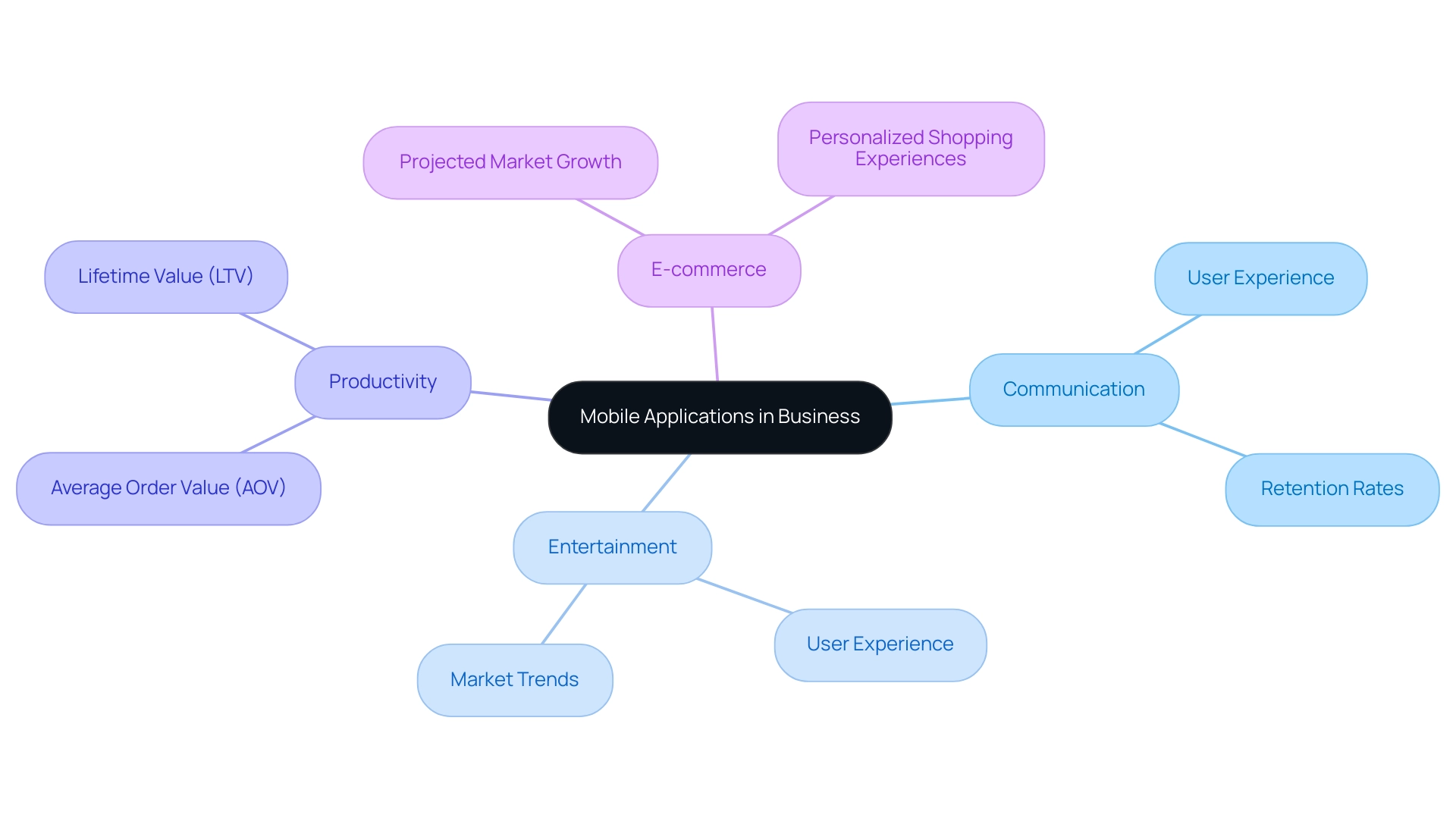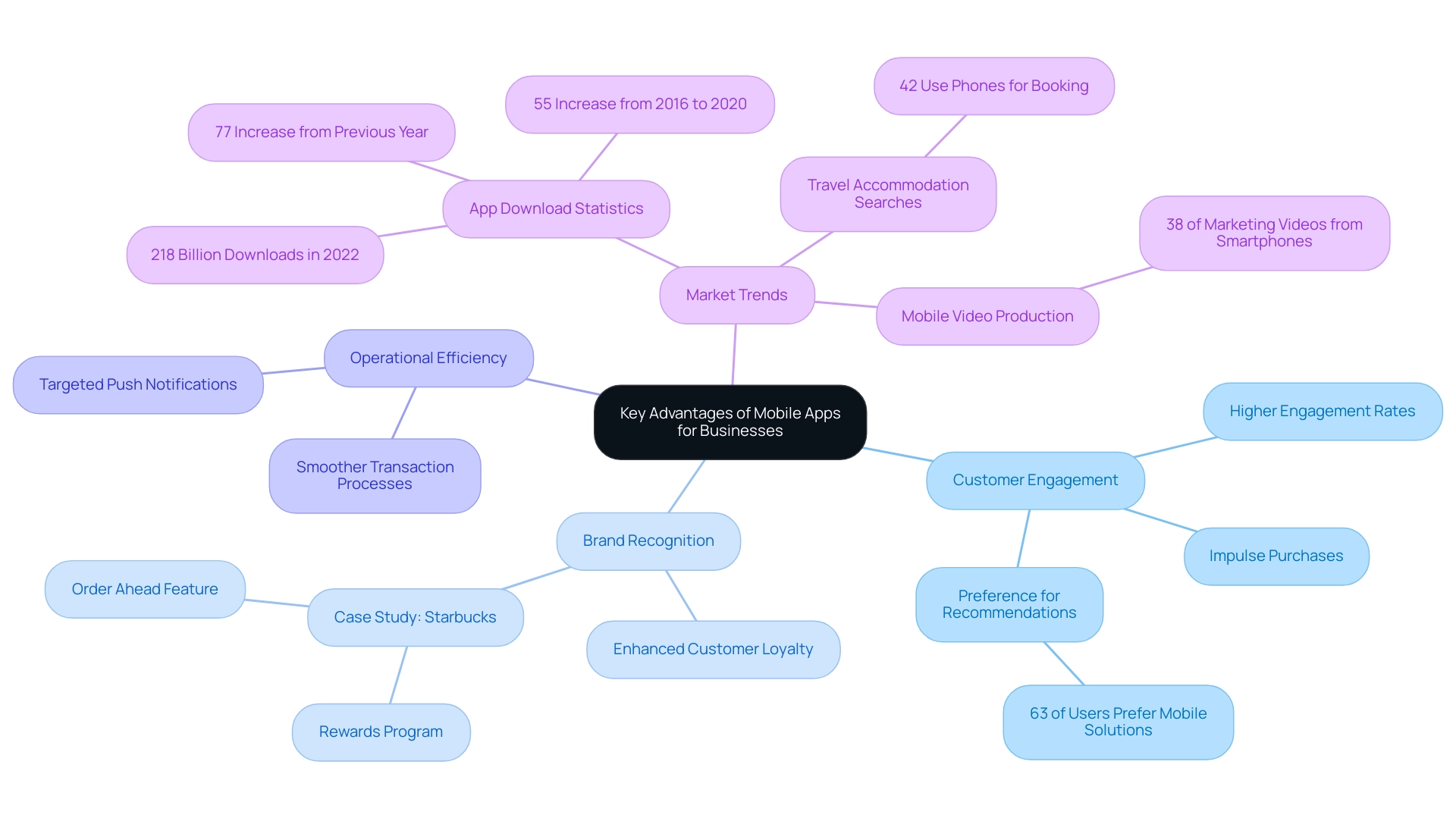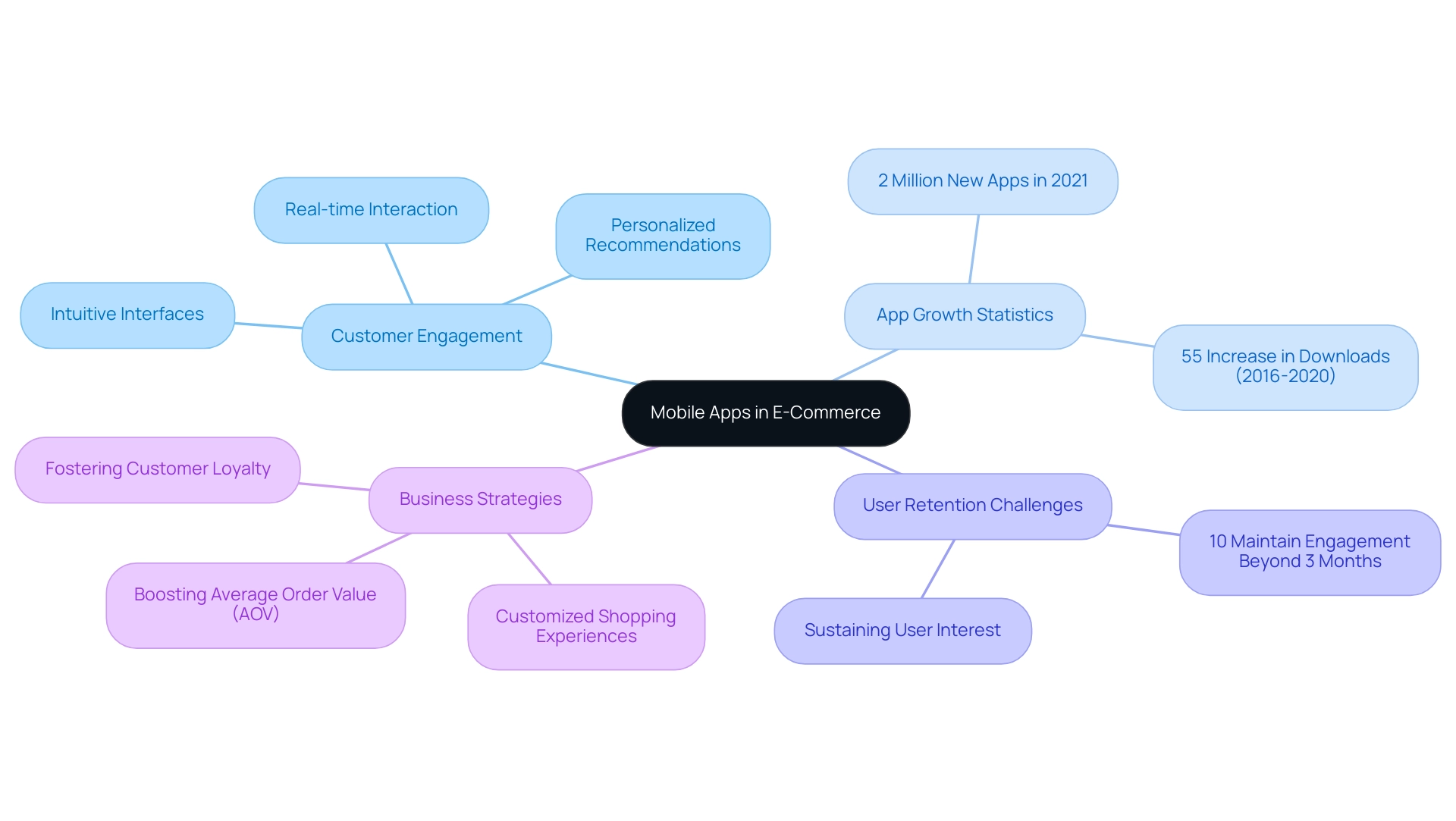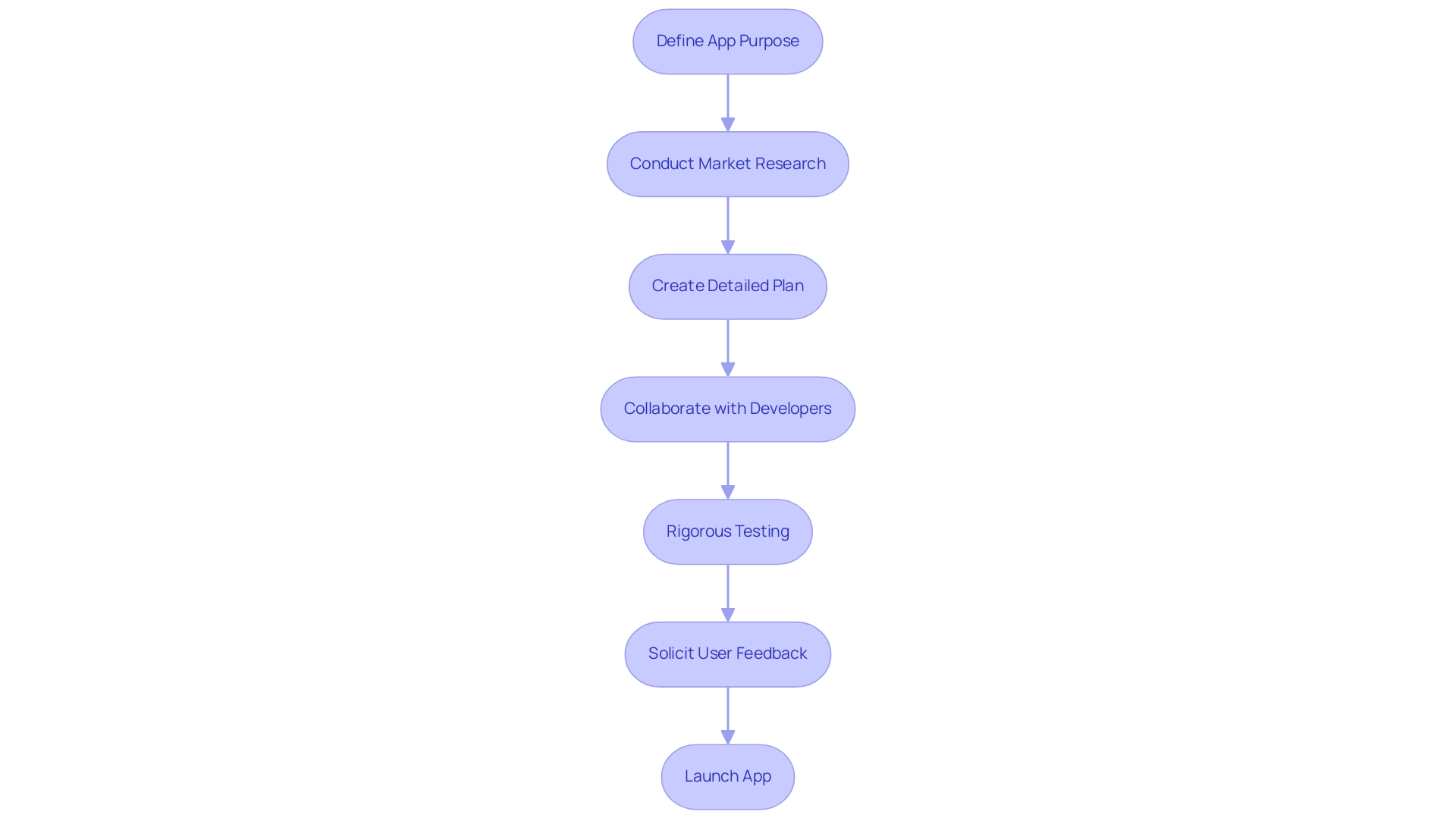Introduction
As the digital landscape continues to evolve, mobile applications have emerged as a vital component of modern business strategies. These versatile tools not only enhance user experiences but also serve as powerful conduits for customer engagement and service delivery.
With the e-commerce market projected to soar to $8.1 trillion by 2026, the importance of mobile apps in facilitating seamless connections between businesses and consumers cannot be overstated. However, the challenge lies in creating compelling experiences that capture and retain user interest, especially in an environment where app abandonment rates are alarmingly high.
This article delves into the multifaceted advantages of mobile apps, their role in enhancing customer engagement, and the essential steps businesses must take to navigate the app development process effectively. By harnessing the potential of mobile technology, companies can not only drive growth but also foster lasting relationships with their customers in an increasingly competitive marketplace.
Defining Mobile Apps: A Cornerstone of Modern Business
Applications for smartphones, tablets, and other portable devices are software solutions tailored to enhance user experiences across various functionalities. These applications serve numerous purposes, including:
- Communication
- Entertainment
- Productivity
- E-commerce
As the e-commerce market is projected to reach a staggering $8.1 trillion by 2026, the role of mobile applications has become increasingly pivotal.
They allow companies to connect with customers seamlessly, providing direct access to services and products with just a few taps. This direct involvement is essential, especially in a time when the turnover rate of Android applications is an astonishing 97.9% after merely 30 days, emphasizing the need for companies to develop engaging and user-friendly application experiences to decrease this turnover. Furthermore, leveraging tailored e-commerce solutions, such as personalized shopping experiences and targeted promotions, can significantly enhance key performance indicators (KPIs) such as:
- Retention rates
- Average Order Value (AOV)
- Lifetime Value (LTV)
Ultimately driving growth.
For instance, companies that have integrated loyalty programs within their mobile platforms have seen a notable increase in customer retention and repeat purchases, directly contributing to incremental revenue. With gaming software representing 28% of the available applications in China, certain categories are gaining substantial market share, highlighting trends that companies should take into account in their application development strategies. The emergence of mobile apps and business has transformed the interaction between companies and consumers, establishing these applications as essential tools in the digital marketing arsenal.
In 2023, global application downloads hit 257 billion, indicating a strong and expanding market that provides companies numerous chances to invest in app development across different sectors. By leveraging these technologies and the expertise gained from over 20 years of experience, companies can significantly enhance their service offerings and customer relationships, ultimately driving growth and innovation in a competitive market.

Key Advantages of Mobile Apps for Businesses
The advantages of mobile apps and business significantly benefit companies, particularly in the areas of customer engagement, brand recognition, and operational efficiency. Recent data reveals a remarkable trend: there were over 218 billion app downloads globally in the year ending December, reflecting a staggering 77% increase from the previous year. Additionally, there was a 55% rise in app downloads from 2016 to 2020, demonstrating the increasing dependence on technology among consumers.
Significantly, 63% of smartphone users demonstrate a preference for shopping with businesses that offer websites or software providing valuable suggestions, highlighting the importance of optimization in enhancing customer engagement. As Gitnux points out, over 42% of customers search for and book travel accommodation through phones, illustrating the critical need for a mobile-first approach in today’s marketplace.
Furthermore, tailored e-commerce solutions, honed over 20 years of global experience, enhance critical KPIs such as retention rates, Average Order Value (AOV), and Lifetime Value (LTV) while building community value.
These solutions are specifically designed to reshape industries, ensuring organizations can adapt and thrive in a competitive landscape. It's crucial to acknowledge that 38% of marketing videos are produced using smartphone software, demonstrating the key importance of technology in contemporary marketing strategies. Mobile apps and business empower companies to send targeted push notifications, keeping customers updated on promotions and new offerings, which enhances engagement and drives loyalty.
Furthermore, the incorporation of portable payment systems leads to smoother transaction processes and higher conversion rates. As demonstrated by Starbucks, the brand's mobile apps and business not only enhance customer loyalty by allowing users to order ahead and earn rewards but also show how operational efficiency can be achieved through effective app utilization. This case study exemplifies the potential of mobile apps and business to foster deeper customer interactions and satisfaction, ultimately reinforcing brand recognition and loyalty in an increasingly competitive market.
Moreover, the relationship between mobile apps and business shows that mobile users display greater engagement and are more inclined to make impulse purchases, further highlighting the significance of mobile optimization to drive success. By leveraging tailored solutions, organizations can build incremental revenue, ensuring sustainable growth and a competitive edge.

Enhancing Customer Engagement and Accessibility Through Mobile Apps
In the realm of e-commerce, mobile apps and business are pivotal in enhancing customer engagement and accessibility for enterprises. Our customized solutions, refined through 20 years of worldwide experience, create a direct line of communication that allows real-time interactions between brands and consumers, ultimately generating additional revenue for enterprises. With the average smartphone owner utilizing 9 to 10 applications daily, features such as chat support, personalized recommendations, and intuitive interfaces significantly enhance user engagement and retention rates.
Notably, in 2021, the app landscape saw 2 million new applications created, underscoring the rapid expansion of this sector. This growth is reflected in the consistent increase in app downloads, which rose by 55% from 2016 to 2020. However, it's important to note that only around 10% of applications can maintain engagement and revenue beyond the initial three months, highlighting the challenges companies face in sustaining user interest.
As commerce on devices is anticipated to seize a growing portion of online transactions, propelled by consumer inclinations for device-friendly platforms, e-commerce leaders like Amazon leverage mobile apps and business strategies to provide customized shopping experiences that align with their internal goals and KPIs. This capability not only increases accessibility and boosts Average Order Value (AOV) but also fosters customer loyalty and satisfaction, which are crucial for sustained engagement in today's competitive market. As mobile apps and business continue to evolve, their capacity to improve customer engagement and accessibility remains a key factor for enterprises aiming to thrive in the digital landscape.

Navigating the Mobile App Development Process for Your Business
Creating an application is a multifaceted process that encompasses several critical steps. At first, companies must define the app's purpose and conduct thorough market research to identify their target audience and understand their specific needs. With this insight, a detailed plan should be created that outlines the app's features and functionalities, ensuring alignment with user expectations.
Collaboration with skilled developers is paramount, as their expertise ensures the app is not only functional but also provides a seamless user experience. As MobiLoud noted,
In 2021 alone, 2 million new applications were created,
highlighting the competitive landscape of mobile app development. It's important to note that about 10% of apps can maintain engagement and revenue beyond the initial 3 months, emphasizing the challenges companies face in retaining users.
Rigorous testing and soliciting user feedback are essential components of the development cycle, allowing for refinements prior to launch. A relevant example is Uber, which has successfully navigated these steps, resulting in an app that is essential to its model. Furthermore, integrating secure technologies, as illustrated in the Blockchain case study, ensures enhanced security and transparency in transactions, despite the challenges of integration complexity and public perception.
By understanding and implementing these best practices, along with the support options available through round-the-clock consultations for mobile apps and business, companies can effectively plan and execute successful mobile app strategies, enhancing user engagement and retention.

Conclusion
Mobile applications have become an indispensable asset for businesses aiming to thrive in the modern digital landscape. Their ability to enhance user experiences, streamline customer engagement, and drive operational efficiency has positioned them at the forefront of business strategies, particularly as e-commerce continues to expand. The staggering growth in app downloads and consumer reliance on mobile technology underscores the necessity for businesses to adopt a mobile-first approach to remain competitive.
Moreover, the advantages of mobile apps extend beyond mere accessibility; they foster deeper connections between brands and consumers. By leveraging tailored e-commerce solutions, businesses can significantly enhance key performance indicators such as retention rates and average order value, ultimately driving sustained growth. The success stories of companies like Starbucks illustrate how effective app utilization can boost customer loyalty and operational efficiency, reaffirming the value of investing in mobile technology.
As the mobile app development process presents its own set of challenges, businesses must navigate this landscape with a strategic mindset. By defining clear objectives, conducting thorough market research, and collaborating with experienced developers, companies can create compelling applications that not only meet user expectations but also encourage long-term engagement. Embracing these best practices will be crucial as businesses seek to harness the full potential of mobile apps in an increasingly competitive marketplace.





